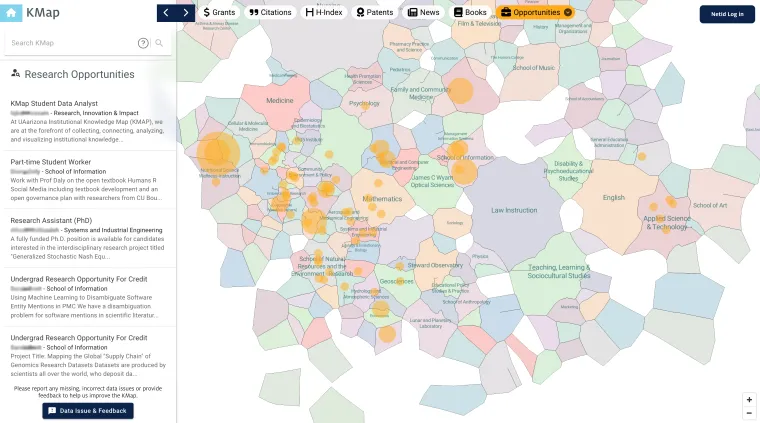UArizona Institutional Knowledge Map
How KMap utilizes research data and the Enterprise Data Warehouse in an interactive way

Explore the University of Arizona’s scholarly research knowledge landscape through the Institutional Knowledge Map (KMap), available to students, staff, and faculty! This institutional data tool pulls research data from internal sources such as Human Resources, Arizona Global, the BIO5 Institute, Tech Launch Arizona, UAccess, as well as other external sources, to provide an easy-to-navigate visualization of research information at UArizona.
The KMap team compiles curated, accurate, and filtered data on publications, abstracts, grants, biographies, research interests and plans, proposals, courses, and more. Users can explore this data through various interactive Knowledge Graphs that are easy-to-use and allow university personnel to explore research knowledge in-depth. The interactive feature of the knowledge map allows for users to explore different areas of the university through various research filters, including what research opportunities are available, how much grant money is being pulled in from different areas of research and which schools pull the most money in, which areas of research have patents, and more.

In August, KMap’s Research Data Science Director, Iqbal Hossain, presented this institutional resource to the UAIR team. Hossain had an opportunity to share how KMap works and how the institutional data that UAIR manages for the university helps to inform the growth and contributions to this data tool. KMap utilizes the Enterprise Data Warehouse, facilitated by UAIR, to pull current employee information, course details, supervisor information, and proposal metadata from the warehouse to help inform the knowledge map. By leveraging UAIR’s knowledge, analytic services, and data modeling capabilities, many of the data integrations from various source systems are made easier for institutional data tools such as this.
The Knowledge Map collects, connects, and visualizes research information for the university – Iqbal Hossain, Director of Research Data Science
One of the core institutional reporting areas and data pillars managed by UAIR is Research data, which serves as a major contribution to various campus-wide data tools and services. The Interactive Fact Book showcases snapshot data on sponsored awards and proposals, along with research and development (R&D) expenditures. More detailed research data can be found in UAccess Analytics, including eDisclosure and Conflict of Interest, contract statuses, trending proposals, or high-performance computing (HPC) awards for primary investigators, and more, which can all be explored with the correct provisioning. Managing this data and providing access to provisioned users is a way in which UAIR continues to support the various data tools and services available (or in development) across campus.
The UArizona Institutional Knowledge Map is an ongoing project that grows each day. Log in with your NetID to submit relevant text about your own research and create your own connection profile!
